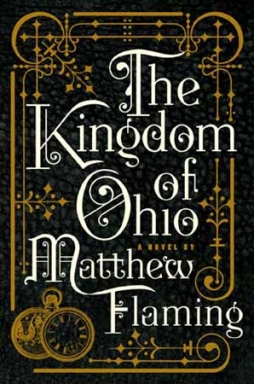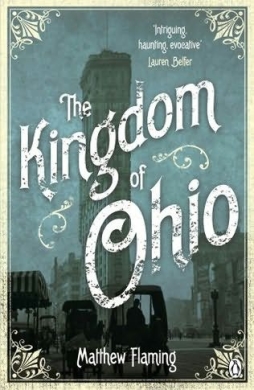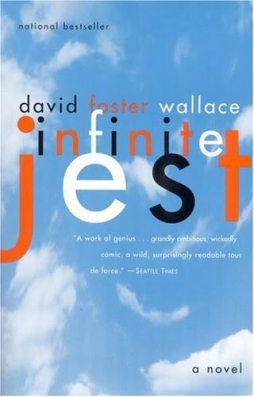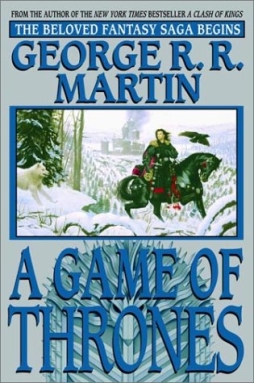American Fabulation, Literary Fantasy, and The Kingdom of Ohio
 How to describe Matthew Flaming’s book The Kingdom of Ohio?
How to describe Matthew Flaming’s book The Kingdom of Ohio?
Well, at least it’s a good story. (Of course I’d have to say that, wouldn’t I? But really: it is.) It’s a story about conspiracies and struggles to reshape the world; about secret wars between men like J.P. Morgan, Thomas Edison, and Nikola Tesla. It is about one of the strangest and least-known mysteries of American history: the existence and disappearance of the Lost Kingdom of Ohio. It is about science and faith, and the distance between the two. Most of all, it’s a story about a man and a woman, and about love.
That’s from an early page of the novel. To this description one might also add: It’s about time, and memory, and the distance between those things as well. It’s about machines, and trains, and the secrets beneath our feet. It’s about the different worlds we live in without noticing. And it is about the way in which these worlds touch.
In terms of plot, the novel follows two strands; one a framing narrative of an old antiques dealer in contemporary Los Angeles, and the other the meat of the book, the story of a young man named Peter Force who was a miner in Idaho in 1899, comes to New York following the death of his father, finds work building the new subway system, and then meets a strange young woman who claims to have travelled in time. We learn that the woman, Cheri-Anne Toledo, is the only daughter of the last King of Ohio, and has collaborated with Nikola Tesla; but Tesla himself seems not to remember her.
Published in 2009, The Kingdom of Ohio is a stunningly assured book, outstanding in its skillful prose and consistent intelligence. The style of the book is powerful, evocative; it builds dreamlike worlds both in Ohio and New York, making a kind of fairy-tale of America, where inventors replace wizards and businessmen stand in for kings (sometimes). Its language is rich and perfect, reflecting a richness of conception — a richness in the way it imagines its setting, in the way it imagines its characters.
Here, for example, is a moment in the life of Nikola Tesla:
Lifting the first cup of coffee to his lips, the inventor draws a deep breath and tries to calm himself by contemplating the smooth curve of its rim, the contrast between the translucent bone-white china and the blackness of the steaming liquid, the ripples on its surface caused by the slight trembling of his hand. And slowly, his anger subsides. If one had time, he reflects, one could lose oneself in the beauty of these details; for even in such small things are all the perfections of mathematics made visible. The wave in motion describing a precise logarithmic function. The law of thaumaturgy: as above, so below. But of course, one does not have time.
The themes of time and beauty are constant preccupations in the book; so are science and systems, the hidden order by which all our lives are structured. And there’s something significant also in the way the passage moves so easily from logarithms to thaumaturgy — wonder-working — and the alchemical law “as above so below.” Science and magic are bound up together in Tesla’s thought; but also in the book overall, the one shading into the other. So the paragraph is not only a haunting evocation of the way a scientist who is also a Romantic thinks (the book associates Tesla with Shelley and Byron, with their tradition of radicalism, art, and beauty), it also advances the themes of the novel as a whole.
 The subway system is a symbol of complex mechanical structures; and the characters find it has a hidden meaning, uniting the thematic concerns of the novel in an unexpected way. The city of New York is another complex structure, a social machine. Just as the book seems to be aware of itself as a structure, as a narrative machine.
The subway system is a symbol of complex mechanical structures; and the characters find it has a hidden meaning, uniting the thematic concerns of the novel in an unexpected way. The city of New York is another complex structure, a social machine. Just as the book seems to be aware of itself as a structure, as a narrative machine.
As far as I can tell, little notice was taken of the book by the sf field when it came out (notwithstanding a cover blurb by Michael Moorcock). The book seems to have been categorised as ‘literary fiction’ by its publisher, or at least that’s where I stumbled across it in my local bookstore. There are good reviews at Strange Horizons and Steampunk Scholar, but not much else that I can find. That’s a pity. This is an excellent book, and clearly sfnal.
On the other hand, the literary-fiction tag may be appropriate. I’ve seen some readers complain that the plot is slow, or that the ending isn’t clear enough. I’d disagree with these assessments. I think the book takes its time for a reason; I think it finds power in the slow investigation of moments, as with Tesla and the cup of coffee. And I think it strikes just the right balance between defining characters (and events) and leaving them evocative.
It’s fair to say that the book wouldn’t work if the style was even slightly out of tune, and fair to say that it’s a book that lives in its language. But the style and language do work; it succeeds in what it aims at. I think it’s a delicate, subtle book, but one that’s also consistently enjoyable in part because it doesn’t insist on subordinating its thematic concerns to its narrative; because it seems to open up as far as it needs to in order to include all its concerns. There’s a feel of freedom to it.
 It’s worth noting that part of this feel, of a richness of background, of ancillary details running free alongside the main movements of the plot, comes from a structural device Flaming uses with extreme cunning: the narrative footnote. It’s reminiscent of David Foster Wallace’s Infinite Jest, but I can’t say I cared much for that book or its use of footnotes, while here I think they’re used much more efficiently and more incisively. They bring out issues of history, and the retelling of history, and of historiography, and of what tellings of what events one can trust. Flaming’s footnotes may refer to archives where some scrap of an official record gives his narrative fragmentary support; they also may refer to books of history that were never published, or imaginatively reconstruct moments that never happened. As with Wallace’s book, they give another perspective on events in the main text; but that in itself also supports the conceits of alternate histories that Flaming plays with.
It’s worth noting that part of this feel, of a richness of background, of ancillary details running free alongside the main movements of the plot, comes from a structural device Flaming uses with extreme cunning: the narrative footnote. It’s reminiscent of David Foster Wallace’s Infinite Jest, but I can’t say I cared much for that book or its use of footnotes, while here I think they’re used much more efficiently and more incisively. They bring out issues of history, and the retelling of history, and of historiography, and of what tellings of what events one can trust. Flaming’s footnotes may refer to archives where some scrap of an official record gives his narrative fragmentary support; they also may refer to books of history that were never published, or imaginatively reconstruct moments that never happened. As with Wallace’s book, they give another perspective on events in the main text; but that in itself also supports the conceits of alternate histories that Flaming plays with.
Ultimately, I suspect that what makes The Kingdom of Ohio rather more a ‘literary fiction’ novel than a ‘speculative fiction’ piece is the way it moves between past and present, and indeed makes no bones about privileging the past over the present. It seems to me that many (though far from all) literary fictions set their main actions, the key events of the text, in a past on which the novel’s nominal present is really only a gloss. I’m not talking about historical fiction; I’m saying that the ‘present’ of many literary novels is determined by a past that we as readers come to understand only slowly, typically through sections of the book set in that past, with the gradual reveal of events developing a narrative drive of its own. The scope of action allowed characters in the present is often circumscribed by these past events, and we don’t come to understand the shape of the story as a whole until we understand what happened when.
 It’s not that genre fiction tales are unaffected by events in the past. But I’d say that genre fiction overall is much more likely to make the present the main field of action. Look at, say, A Song of Ice and Fire; everything that happens is clearly affected by the betrayals and wars and so forth of past history, but we follow characters in the present negotiating with each other based on that past — maybe they’re trying to build a future, maybe the past has broken them, but we follow them in the now as it moves ever onward. It seems to me (and it’s possible my experiences are idiosyncratic) that a contemporary ‘literary fiction’ equivalent take on the story would set several chapters in the past, probably as many or more as are set in the present, and that the grander actions which define the story would take place then, not now.
It’s not that genre fiction tales are unaffected by events in the past. But I’d say that genre fiction overall is much more likely to make the present the main field of action. Look at, say, A Song of Ice and Fire; everything that happens is clearly affected by the betrayals and wars and so forth of past history, but we follow characters in the present negotiating with each other based on that past — maybe they’re trying to build a future, maybe the past has broken them, but we follow them in the now as it moves ever onward. It seems to me (and it’s possible my experiences are idiosyncratic) that a contemporary ‘literary fiction’ equivalent take on the story would set several chapters in the past, probably as many or more as are set in the present, and that the grander actions which define the story would take place then, not now.
There may be less difference than similarity here. I think most good stories, literary or genre, have an awareness of the importance of the past, and the way it shapes present and future. But I think that whereas structurally the approach of ‘literary fiction’ (I don’t like the quote marks, but I like the phrase even less; sadly, I can’t think of a better one) is frequently to emphasise how the present relies on the past and is shaped by it, the approach of genre fiction emphasises the present as the only hope for setting the past to right. The present gives us, as I said, a field for action — as opposed to a limited scope, defined by the greater events of the past.
In this as in many things, The Kingdom of Ohio cannily positions itself between forms. Most of the action takes place in the past, so the present is a framing device — which becomes structurally justified as the book moves on, and the two narrative threads move toward a union. Ironically, the present-day parts are written in the past tense; the past actions are written in present tense. Use of the present tense is a powerful but obtrusive technique, probably more common in ‘literary’ fiction than genre writing, at least for a novel-length work; Flaming uses it well, and I think justifies it not only as the technique that the narrator of those passages would use, and not only as a useful device giving the different narratives of the book different tones, but also as a choce that plays into the novel’s concern with time — with the past as set against the present.
 So structurally and stylistically the feel of the book is what is typically called literary. But the story itself, the approach to it, the fabulation of it, the play with history and with what never happened, I think has to be viewed as fantasy, if not as science fiction. You could say that it’s steampunk at its most fantastic. But I think you could argue that it’s something else, as well, something which overlaps with steampunk.
So structurally and stylistically the feel of the book is what is typically called literary. But the story itself, the approach to it, the fabulation of it, the play with history and with what never happened, I think has to be viewed as fantasy, if not as science fiction. You could say that it’s steampunk at its most fantastic. But I think you could argue that it’s something else, as well, something which overlaps with steampunk.
Let’s call it “American Fabulation”: a story that plays about with industrial America, a story that’s a parable in some way reimagining the history of the country. Mark Helprin’s Winter’s Tale would be maybe the classic fantasy example (one of the few issues I have with The Kingdom of Ohio is that it seems to recall Helprin’s Winter’s Tale perhaps too closely; but then I suspect Flaming is at least conscious of the influence, and named his main character Peter Force in homage to Helprin’s Peter Lake). But a full alternate history isn’t necessary; Joyce Carol Oates’ Bellefleur is a particularly Gothic example, and somewhat similar to The Kingdom of Ohio in the way it unites French aristocracy to its American subject matter. You can also find historical fiction that I think fits the form; John Crowley’s Four Freedoms, for example, or Michael Chabon’s Amazing Adventures of Kavalier & Klay, or E.L. Doctorow’s Ragtime, or maybe even Scorsese’s Gangs of New York. You could probably go back to Citizen Kane and The Great Gatsby, stories of American successes, of power and wealth and their effect on the individual and society. Literally fabulation: symbolic fables about the history of America.
The message, or a message, of The Kingdom of Ohio is that history isn’t neat; that it doesn’t have only one message, or one interpretation. There are an infinite number of pasts as there are an infinite number of futures. In that richness there is a great possibility for some misstep or another; but a great possibility as well for story, for the recovery of some narrative that can shed light on all possible worlds. I’m comfortable with saying that The Kingdom of Ohio is a true literary fantasy; a work that uses the fantastic in structures typically described as ‘literary’ to create a wonderful story of what might have been and might yet be. If you can find it, and if you enjoyed Winter’s Tale and Crowley’s The Solitudes (Ægypt and its sequels), then I cannot recommend this book highly enough.
Matthew David Surridge is the author of “The Word of Azrael,” from Black Gate 14. His new ongoing web serial is The Fell Gard Codices. You can find him on facebook, or follow his Twitter account, Fell_Gard.
Reading this, I was reminded of an author from a different genre: Ross MacDonald and the Lew Archer series. Detective fiction. MacDonald’s plots frequently weave the past and present together in an intricate way where not only does the past drive the present, but understanding the past is the only way to make sense of the present. The action takes place mostly in the present, but the past becomes clear from Detective Archer’s efforts to understand some current mystery. The Underground Man is perhaps his best example of this. Interestingly enough, MacDonald is often considered the most literary of the old-school Detective writers. Maybe you’re onto something here…
I’m going to have to look for The Kingdom of Ohio
Okay, this one goes to the top of my To Be Read pile. It’s hard to find a sf/f novel these days that takes its time. I understand why the publishing industry likes books that, as Donald Maass puts it, grab the reader by the hair on the first page and drag the reader at breakneck pace to the last page, but I really think a more variable pace is–in addition to being more to my personal taste–more of an accomplishment. I like a book with some expressive range. Sounds like you’ve scouted out a winner here.